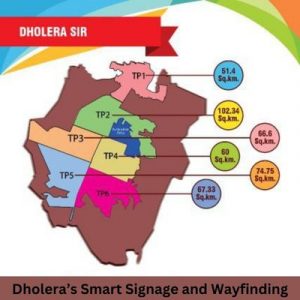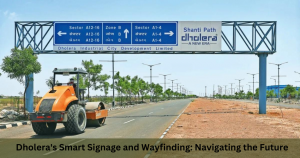Dholera, a planned smart city in the Indian state of Gujarat, epitomizes the future of urban development. It is one of India’s most ambitious infrastructure projects, aimed at creating a sustainable, technologically advanced, and economically vibrant urban space. Central to this vision is using big data, which plays a crucial role in every aspect of Dholera’s planning, from infrastructure development and environmental management to public services and economic growth. This blog explores the multifaceted role of big data in shaping Dholera’s planning and its implications for urban development worldwide.
The Genesis of Dholera Smart City
Dholera Special Investment Region (SIR) is part of the Delhi-Mumbai Industrial Corridor (DMIC), a major infrastructure project designed to spur industrial growth and urbanization in India. Over 920 square kilometers, Dholera SIR is envisioned as a self-sustaining, future-ready city equipped with state-of-the-art infrastructure and technologies. The city aims to accommodate over two million residents and generate massive employment opportunities, leveraging its strategic location and advanced planning methodologies.
Big Data: The Backbone of Smart City Planning
Big data refers to the vast volumes of data generated from various sources, including social media, sensors, devices, video, and transactional applications. The ability to collect, store, process, and analyze this data is transforming urban planning and management in unprecedented ways. In Dholera’s context, big data is instrumental in several key areas:
- Urban Infrastructure Development
- Environmental Sustainability
- Public Services and Safety
- Economic Development
- Citizen Engagement and Quality of Life
Urban Infrastructure Development
Smart Infrastructure
Big data analytics helps in designing and developing smart infrastructure in Dholera. Real-time data from sensors embedded in roads, bridges, and buildings allow for continuous monitoring of infrastructure health. Predictive analytics can foresee potential issues, facilitating proactive maintenance and reducing downtime. This ensures the longevity and resilience of the infrastructure, crucial for a city exposed to natural and man-made risks.
Efficient Transportation Systems
Transportation planning in Dholera heavily relies on big data. By analyzing traffic patterns, commuter behavior, and real-time data from GPS-enabled vehicles, planners can optimize routes, reduce congestion, and improve public transport efficiency. Additionally, data from various transportation modes can be integrated to develop a seamless multi-modal transport network, enhancing connectivity and reducing travel times.
Environmental Sustainability
Smart Grids and Energy Management
Dholera aims to be a green city with sustainable energy practices. Big data plays a pivotal role in managing smart grids, which use real-time data to balance supply and demand, integrate renewable energy sources, and minimize energy loss. Advanced analytics can forecast energy consumption patterns, enabling more efficient energy distribution and reducing the city’s carbon footprint.
Water Resource Management
Water is a critical resource, and its management is paramount in Dholera. Big data aids in monitoring water quality, usage patterns, and distribution networks. Sensors in water pipelines can detect leaks, reducing wastage. Additionally, predictive models can help in planning water usage during peak demand periods, ensuring sustainable water management and supply.
Environmental Monitoring
To maintain Dholera’s commitment to sustainability, environmental monitoring systems collect data on air quality, noise levels, and weather conditions. This data helps in implementing pollution control measures, urban green space planning, and disaster management strategies, contributing to a healthier living environment.
Public Services and Safety
Healthcare
In the realm of healthcare, big data enables personalized and predictive medicine. By analyzing health data from various sources, healthcare providers in Dholera can identify health trends, predict outbreaks, and tailor medical treatments to individual patients. This enhances the overall healthcare quality and accessibility for the city’s residents.
Education
Big data transforms education by enabling personalized learning experiences. Data from educational platforms can be analyzed to understand student performance, learning patterns, and areas needing improvement. This allows educators to tailor their teaching methods and resources to better meet the needs of their students.
Public Safety
Ensuring the safety of residents is a top priority. Big data analytics can enhance public safety by predicting crime hotspots, optimizing the deployment of law enforcement resources, and improving emergency response times. Real-time data from surveillance systems, social media, and other sources can be analyzed to detect and respond to incidents swiftly.
Economic Development
Industry and Business Growth
Big data is a catalyst for economic growth in Dholera. By analyzing market trends, consumer behavior, and economic indicators, businesses can make informed decisions, optimize their operations, and identify new opportunities. The availability of open data can also foster innovation and entrepreneurship, attracting investments and creating jobs.
Smart Governance
Effective governance is critical for the success of Dholera. Big data enables smart governance by improving transparency, accountability, and citizen engagement. Data-driven decision-making allows government agencies to optimize resource allocation, streamline processes, and enhance service delivery.
Citizen Engagement and Quality of Life
Participatory Planning
Big data empowers citizens to actively participate in the planning and development of their city. Platforms that collect and analyze citizen feedback can help planners understand the needs and preferences of the residents, ensuring that the city’s development aligns with their expectations. This participatory approach fosters a sense of community and ownership among the residents.
Enhancing Quality of Life
Ultimately, the goal of utilizing big data in Dholera’s planning is to enhance the quality of life for its residents. By ensuring efficient services, sustainable practices, and robust infrastructure, big data contributes to creating a livable, resilient, and vibrant city. From smart homes to green spaces, every aspect of urban life is optimized to provide a high standard of living.
Challenges and Considerations
While the benefits of big data in urban planning are immense, several challenges and considerations must be addressed:
- Data Privacy and Security: Protecting the privacy and security of citizens’ data is paramount. Robust data governance frameworks and cybersecurity measures are essential to prevent data breaches and misuse.
- Data Integration and Interoperability: Integrating data from diverse sources and ensuring interoperability between different systems can be complex. Standardized data formats and protocols are necessary to facilitate seamless data exchange.
- Data Quality and Accuracy: The effectiveness of big data analytics depends on the quality and accuracy of the data. Implementing stringent data validation and quality assurance processes is crucial to obtain reliable insights.
- Digital Divide: Ensuring that all residents have access to digital technologies and the skills to use them is vital for equitable development. Efforts must be made to bridge the digital divide and promote digital literacy.
- Ethical Considerations: The use of big data raises ethical questions regarding surveillance, autonomy, and fairness. Transparent and ethical data practices must be upheld to maintain public trust.
The Future of Urban Planning
Dholera’s approach to utilizing big data in urban planning sets a precedent for future smart cities. The lessons learned and best practices developed in Dholera can be replicated in other cities, paving the way for more intelligent, sustainable, and resilient urban environments globally.
Conclusion
Big data is revolutionizing urban planning, and Dholera stands as a testament to its transformative potential. By leveraging data-driven insights, Dholera is poised to become a model smart city, exemplifying sustainable development, efficient governance, and enhanced quality of life. As cities around the world grapple with the challenges of rapid urbanization, Dholera’s experience underscores the critical role of big data in creating the cities of tomorrow.




